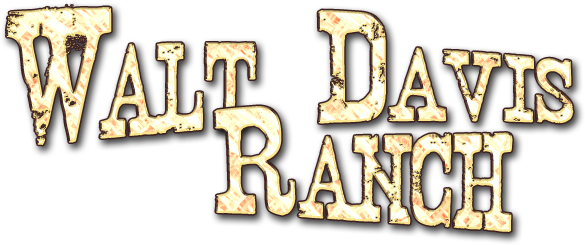
Walt Davis - Author, Agricultural Consultant, and Rancher

Making Ends Meet
I received a letter recently from a young lady in the Midwest - she did not give her name - that describes an all too common situation; she and her husband have bought land and are in the process of buying more. Between land payments, equipment payments and operating expense there is very little left over to support the family and none to be set aside for savings or emergencies. I get inquiries like this on a regular basis and decided to put some of the advice that I dole out in a column. I also address this situation in my book The Green Revolution Delusion.
I understand the desire to own land; with some people, myself included, owning land is almost a hunger. I don't quarrel with wanting to own land but I do suggest that buying land is seldom the best use of capital and credit when these items are in short supply as they normally are with young people starting out. One of the most powerful and most often overlooked principles of holistic management is that at any point in time there is always one place where money applied will yield the best results. Notice that I did not say "the greatest return", sometimes other factors such as reducing risk or positioning the business for future gains will be more beneficial than an immediate return on investment. Most of the time the choice will be much simpler; buy a new piece of equipment (when with a little TLC the old one is still serviceable) or buy some livestock that will appreciate in value. One key to making good financial decisions is to weigh each decision against what you are trying to accomplish; will this expenditure pay for itself and yield a profit? Will spending this money solve a problem that truly needs to be solved or will it have to be repeated again next year? Any expense that has to be repeated time and time again should be a red flag warning that an opportunity exists to improve management. If there is no way to eliminate a burdensome recurring expense, perhaps it is time to completely re-plan the business. If fuel, fertilizer, chemicals, and equipment repairs prevent cropping from being profitable, maybe the cropland should be put to another use. The amount of money coming in is not nearly as important as the difference between what is coming in and what is going out. We tend to fixate on production when the real goal should be profit.
Vital to being consistently profitable is a well thought out financial plan detailing what will be spent and what income can be expected. This plan should address every enterprise in the operation separately so that it can be determined which enterprises make money and which do not. An enterprise is anything that either generates money or consumes money; most do both. Typical enterprises for glaziers would be things like: beef cows, purchased stockers, raised stockers, heifer development, hay making, etc. etc. Each enterprise is credited with income earned and debited for expense generated. The cow herd "sells" calves to the stocker enterprise and "buys" hay from the hay enterprise always at fair market value. If thought is put into the process and realistic figures are used, the plan can go a long way towards building a profitable business. Making the figures work on paper does not guarantee success in real life but if it will not work on paper, it is very doubtful that it will work in reality.
Another powerful tool from holistic management is the process of goal making. To my mind the most important goal is always the quality of life for all of the family. What is truly important to you and yours; every family will be different but most will have variations on topics like financial security, practicing and teaching your faith, education and personal growth for everyone. It is very easy to get so caught up in trying to build a successful operation that we forget some of the things that are really important; having the funds needed to provide the necessities of life is paramount but having a little for the fun things is important as well. Even more important is time to be spent with family. Working together can be a powerful teaching and bonding process especially when praise and appreciation is generous but don't let childhood slip away without you being there to enjoy it with your kids.



